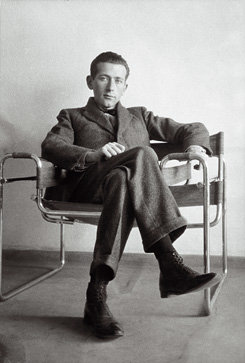Marcel Breuer
dal 3/5/2007 al 1/7/2007
Segnalato da
3/5/2007
Marcel Breuer
Ludwig Museum, Budapest
Design and Architecture. This retrospective created by the Vitra Design Museum is the first to present his design work and the models of his most important buildings together. Sketches, floor plans and a huge number of photographs help to summarize the main creative elements and construction principles that characterize both his buildings and his furniture.

Design and Architecture
Curators: Matthias Remmele, Krisztina Uveges
Born in Pécs, Hungary, Marcel Breuer (1902–1981) was one of the most influential designers and architects of twentieth century modernism. One of the raisons d’être of this large exhibition was the 100th anniversary of the birth of the artist – the exhibition has been travelling around the world since 2002. In Hungary, it is particularly important to shed light on Breuer’s oeuvre, up till now familiar mostly to professionals. The message of his œuvre, i.e. that architecture, preserving its traditions, must create a livable environment according to the needs of the people, is still valid in our time.
The Marcel Breuer retrospective created by the Vitra Design Museum (Weil am Rhein) is the first to present his design work and the models of his most important buildings together. In Europe, Breuer is primarily known as a designer while in America, as a teacher and architect; the exhibition aims at creating balance in the two different areas as well as introducing this great artist to the Hungarian audience. Furniture pieces, drawings, furniture catalogues and photographs of inner spaces designed by Breuer are collected to offer an overview of his design oeuvre. The exhibition presents almost all the results of his long career as a designer, organized chronologically, thematically and by material (wood, tubular steel, aluminium and plywood). In the ‘Tubular Steel’ section many original pieces illustrate Breuer’s experimentation with the new functional possibilities of the material. Breuer’s pioneering decision of using tubular steel for his furniture designs was not commercially successful at the start but it appealed to the European avant-garde – artists as Walter Gropius, Wassily Kandinsky, László Moholy-Nagy and Alvar Aalto started furnishing their private homes and offices with Breuer’s pieces thus making his tubular steel furniture an icon of modernism.
The exhibition renders Breuer’s architectural activity in three categories: Houses, Spaces and Volumes. 12 models specifically fabricated for this exhibition present his buildings, as the Breuer House I-II., the Whitney Museum, the churches and others, exemplifying the four basic building types in his oeuvre. Sketches, floor plans and a huge number of photographs help to summarize the main creative elements and construction principles that characterize both his buildings and his furniture which is still being produced.
Ludwig Museum
9th Komor Marcell 1 (Palace of Arts) - Budapest



